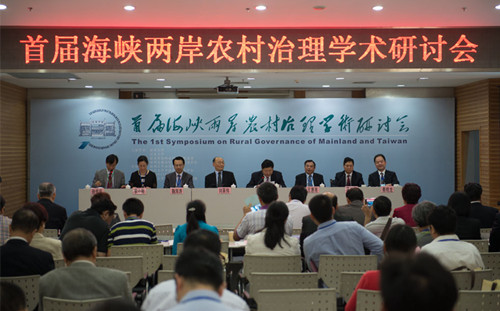From November 7-8 2015, the 1st symposium on rural governance of mainland and Taiwan was held in Guangzhou University, with a total of 140 participants including experts, scholars and administrators from the Research Center for Relations across the Taiwan Straits of Taiwan Affairs Office of the State Council, Guangdong Provincial and Guangzhou Municipal Taiwan Affairs Office. This symposium is one of a series of major events launched by Taiwan Affairs Office of the State Council on modernization construction of the system and capability of rural governance.

Hosted by Senior think tanks, the symposium was aimed at promoting cooperation and exchanges in agriculture, rural areas and farmers across the Taiwan Straits
This meeting was cohosted by GU, Pingtung University, Guangdong Association for the Promotion of Exchanges across the Taiwan Straits, Guangzhou- Taiwan Economic and Cultural Exchange Center and Southern Rural Research Center of Sun Yat-sen University. As a joint think tank of social sciences established by GU and Guangzhou Taiwan Affairs Office, Taiwan Research Institute has organized several large-scale field researches on local rural governance, and has established a quality research network and a good reputation with its research achievements since 2013.
According to the Director of GU Taiwan Research Institute, Taiwan Research Institute has unswervingly worked to construct itself as a high-end think tank with characteristics which serves to the cause of peace across the Taiwan Strait with its research fields in rural governance, educational policy, marriage and family and folk religion across the Taiwan Straits. This joint “1st Symposium on Rural Governance of Mainland and Taiwan” was intended to facilitate experience sharing in rural governance, promote development quality of rural areas, and deepen the exchanges in agriculture, rural areas and farmers across the Taiwan Strait based on the current research.
The symposium focused on local experiences and institutional innovation while looked into the future as well
The delegates discussed on “Experience in rural governance of Taiwan”, “Experience in rural governance of Mainland” and “Outlook of rural governance across the Taiwan Straits”. They dissected local experiences in rural governance across the Taiwan Straits and spared no effort in revealing the significance of these experiences in the institutional innovation in order to create favorable conditions for institutional transplant and policy innovation during rural governance across the Taiwan Straits.
As one of the main topics of this meeting, the Modern East Asia Agricultural Pattern was referred to the development patterns created by Taiwan, South Korea and other countries or regions in the course of agricultural modernization. On account of the differences of agriculture and rural governance system across the Taiwan Straits as well as the contemporary crisis the Modern East Asia Agricultural Pattern encountered, the participants made an in-depth discussion and reflected on historical implications of this Pattern in a bid to seek for a road for rural development in dual comparison of the east Asian and the western as well as Taiwan and the mainland.
With deep understanding of experiences in rural governance across the Taiwan Straits, participants reached a consensus on the combination of tradition and modernization in rural governance across the Taiwan Straits. They agreed that innovation on grassroots social governance should be motivated by drawing available resources in traditional culture such as local customs. Furthermore, it should be noted that the government’s responsibility is of significance in rural grass-roots governance, especially its role in public service, rural information technology development, rural planning, cultivation of new agricultural business, and entrepreneurship of the migrant workers who return to their hometowns.
Foregoers of socialist village models attended the symposium which highlighted the insistence on values and the demonstration effect
When talked about mainland’s experience in rural governance, the symposium set a session to “talk about the socialist village models”, in which four foregoers of the socialist village models attended. The delegates paid high attention to this session.
These four heads are Lei Zongkui who is Secretary of the Party Committee of Zhou Jia Zhuang Villgae in Jinzhou in Hebei Province, Fu Huating who is Secretary of CPC General Branch of Xing Shi Si Village in Gan Nan County in Hei Long Jiang Province, Li Huailian who is Deputy Secretary of CPC Party Branch and Liu Mingxuan who is Deputy Secretary of Liu Zhuang Village in Xinxiang in Henan Province. Their villages serve as examples in the system and capability of rural governance in mainland. During the meeting, they shared their experiences in issues including ways of realizing common prosperity, system foundation of constructing beautiful villages, and common prosperity effect under the boom of collective economies. After listening to their speeches, the scholars concluded that the success of these villages showed that in the course of agricultural modernization and modernization of the system and capability of rural governance, it is reasonable and exemplary for rural grass-roots governance to keep to the values of collectivism and common prosperity in this new historical period.